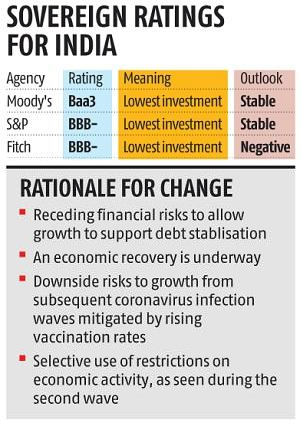Indian Economy
Sovereign Credit Ratings
- 09 Oct 2021
- 4 min read
Why in News
Ratings agency Moody's has changed India's sovereign rating outlook to “Stable" from “Negative" and affirmed the country's rating at “Baa3".
- “Baa3" rating is the lowest investment grade, just a notch above junk status (Speculative).
Key Points
- Sovereign Credit Rating (SCR):
- SCR is an independent assessment of the creditworthiness of a country or sovereign entity.
- It can give investors insights into the level of risk associated with investing in the debt of a particular country, including any political risk.
- In addition to issuing bonds in external debt markets, another common motivation for countries to obtain a sovereign credit rating is to attract Foreign Direct Investment (FDI).
- At the request of the country, a credit rating agency will evaluate its economic and political environment to assign it a rating.
- Moody’s considers a Baa3 or higher rating to be of investment grade, and a rating of Ba1 and below is speculative.
- S&P gives a BBB- or higher rating to countries it considers investment grade, and grades of BB+ or lower are deemed to be speculative or "junk" grade.
- Economic Survey’s Stance on SCRs:
- India has consistently been rated below expectation as compared to its performance on various parameters during the period 2000-20.
- India remained a clear outlier on several parameters such as GDP growth rate, inflation, general government debt, political stability, rule of law, control of corruption, investor protection, ease of doing business, sovereign default history, etc.
- India’s ability to pay can be gauged not only by the extremely low foreign currency-denominated debt of the sovereign but also by the comfortable size of its foreign exchange reserves that can pay for the short term debt of the private sector as well as the entire stock of India’s sovereign and non-sovereign external debt.
- India's fiscal policy should be guided by considerations of growth and development rather than be restrained by "biased and subjective" sovereign credit ratings.
- It recommended that developing economies must come together to address this bias and subjectivity inherent in sovereign credit ratings methodology to prevent exacerbation of crises in future.
- India has consistently been rated below expectation as compared to its performance on various parameters during the period 2000-20.
Credit Rating
- A credit rating is a quantified assessment of the creditworthiness of a borrower in general terms or with respect to a particular debt or financial obligation.
- A credit rating can be assigned to any entity that seeks to borrow money—an individual, corporation, state or provincial authority, or sovereign government.
- A rating agency is a company that assesses the financial strength of companies and government entities, especially their ability to meet principal and interest payments on their debts.
- Fitch Ratings, Moody’s Investors Service and Standard & Poor’s (S&P) are the big three international credit rating agencies controlling approximately 95% of global ratings business.
- In India, there are six credit rating agencies registered under Securities and Exchange Board of India (SEBI) namely, CRISIL, ICRA, CARE, SMERA, Fitch India and Brickwork Ratings.







